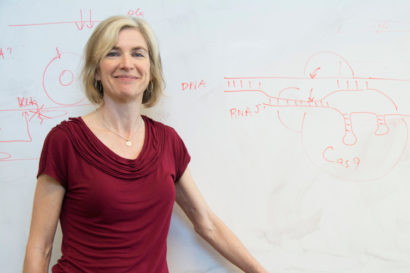Eighth CRISPR patent issued by U.S.; seven more soon to come
The U.S. Patent and Trademark Office (USPTO) has awarded a new patent to the University of California (UC), University of Vienna, and Dr. Emmanuelle Charpentier covering methods of producing a genetically modified cell through the introduction of the Cas9 protein, or a nucleic acid encoding the Cas9 protein, as well as a single molecule DNA-targeting RNA. This patent (U.S. 10,351,878) covers the use of this method in a cell.

Together, the patent issued today and previously issued patents cover compositions and methods that allow for targeting and editing genes in any setting, including within plant, animal, and human cells, as well as modulating transcription. Today’s issuance follows the award of seven other related patents in UC’s steadily growing CRISPR-Cas9 portfolio, with the most recent patent issuing on July 2 covering genome editing in a cell using a CRISPR protein-RNA complex. Additionally, there are seven more applications expected to issue as patents in the coming months, bringing UC’s portfolio to 15 total patents.
“The number of patents associated with the Doudna-Charpentier team’s breakthroughs and the increasing breadth of its CRISPR-Cas9 portfolio reflect upon the significance of these inventions and the range of new possibilities they introduce for the benefit of human welfare,” said Eldora L. Ellison, Ph.D., lead patent strategist on CRISPR-Cas9 matters for UC and a Director at Sterne, Kessler, Goldstein & Fox. “We are pleased to add this technique to our portfolio as yet another breakthrough that will ultimately enable more people to live healthier lives.”
The Doudna-Charpentier team that invented the CRISPR-Cas9 DNA-targeting technology included Jennifer Doudna and Martin Jinek at the University of California, Berkeley; Emmanuelle Charpentier (then of Umea University); and Krzystof Chylinkski at the University of Vienna. The methods covered by today’s patent, as well as the other methods claimed in UC’s previously issued patents and those set to issue, were included among the CRISPR-Cas9 gene editing technology work disclosed first by the Doudna-Charpentier team in its May 25, 2012 priority patent application.
Additional CRISPR-Cas9 patents in this team’s portfolio include 10,000,772; 10,113,167; 10,227,611; 10,266,850; 10,301,651; 10,308,961; and 10,337,029. These patents remain unchallenged and are not a part of the PTAB’s recent interference declaration between 10 UC patent applications and multiple previously issued Broad Institute patents and one application, which jeopardizes essentially all of the Broad’s CRISPR patents involving eukaryotic cells.
International patent offices have also recognized the pioneering innovations of the Doudna-Charpentier team, in addition to the eight patents granted in the U.S. The European Patent Office (representing more than 30 countries), as well as patent offices in the United Kingdom, China, Japan, Australia, New Zealand, Mexico, and other countries, have issued patents for the use of CRISPR-Cas9 gene editing in all types of cells.
University of California has a long-standing commitment to develop and apply its patented technologies, including CRISPR-Cas9, for the betterment of humankind. Consistent with its open-licensing policies, UC allows nonprofit institutions, including academic institutions, to use the technology for non-commercial educational and research purposes.
In the case of CRISPR-Cas9, UC has also encouraged widespread commercialization of the technology through its exclusive license with Caribou Biosciences, Inc. of Berkeley, California. Caribou has sublicensed this patent family to numerous companies worldwide, including Intellia Therapeutics, Inc. for certain human therapeutic applications. Additionally, Dr. Charpentier has licensed the technology to CRISPR Therapeutics AG and ERS Genomics Limited.
